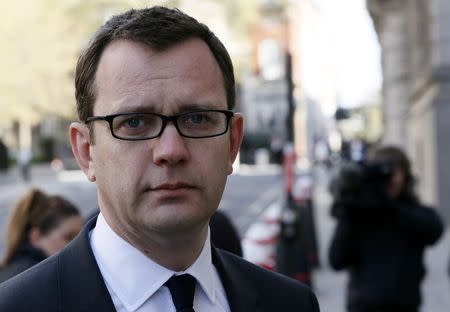Editors ran Murdoch paper where 'rotten state' existed, court hears
By Michael Holden LONDON (Reuters) - Rebekah Brooks and Andy Coulson would have been incompetent to not know of phone-hacking when they edited Rupert Murdoch's News of the World amid a "rotten state of affairs", prosecutors told a London court on Wednesday. Brooks, who later ran News Corp.'s British newspaper arm, and Coulson, British Prime Minister David Cameron's media chief until 2011, are accused of conspiracy to hack mobile phones and authorising illegal payments to public officials. Brooks also faces a charge of perverting the course of justice by trying to hinder the police inquiry. They deny the accusations. Murdoch closed the News of the World in 2011 amid a public furore over phone-hacking at the paper, which rocked his media empire, sent shockwaves through Britain's political establishment and led to Brooks' resignation. In his closing speech to London's Old Bailey court, prosecutor Andrew Edis said top editors would have known their staff were engaged in illegally accessing voicemails on mobile phones if they were doing their jobs properly. He reminded the jury three senior news desk editors had pleaded guilty to phone-hacking charges. They had worked "hand in glove" with Brooks, Coulson and the paper's managing editor Stuart Kuttner, who is also on trial, Edis added. "The investigation has clearly proved there was a rotten state of affairs at the top of that organisation," he said. "What you have to decide is whether these one or two people above knew of that rotten state of affairs which permeated the organisation they were supposed to be running. "It was their job to know. Are these people incompetent? Are they so careless and so unconcerned about what's happening on their watch that they didn't notice?" he asked. BROOKS DENIES KNOWLEDGE Edis asked if this was a case "where young, inexperienced, talented, ambitious, clever, charming people have been placed in a position of great power" and "allowed themselves in their excitement of the chase" to say it didn't matter if what they did was lawful because "we just want the story". Giving her evidence, Brooks denied any knowledge of phone-hacking at the paper she edited from 2000 to 2003 while Coulson, her successor as editor until 2007, told the court he had only been aware of one instance of phone-hacking. However, Edis told the jury that Brooks had delivered a "carefully choreographed, well-scripted performance" and the jury needed to "see behind the mask". "There has been a fair amount of choreography in some of the way these defences have been presented to you," he said. He also told the court that the prosecution was not an attack on the freedom of the press nor on the tabloid press. "We accept that a free press is an essential part of the protections of a democratic society," he said. "The ultimate protection of a democratic society is the rule of law, that applies to newspapers in the same way as it does to you, me or anybody else." Closing speeches in the trial of Brooks, Coulson, Kuttner and four others, which began seven months ago, are due to last a few weeks. The jury is expected to be sent out to consider their verdict at the end of the month. (Editing by Tom Heneghan)

 Yahoo News
Yahoo News 

